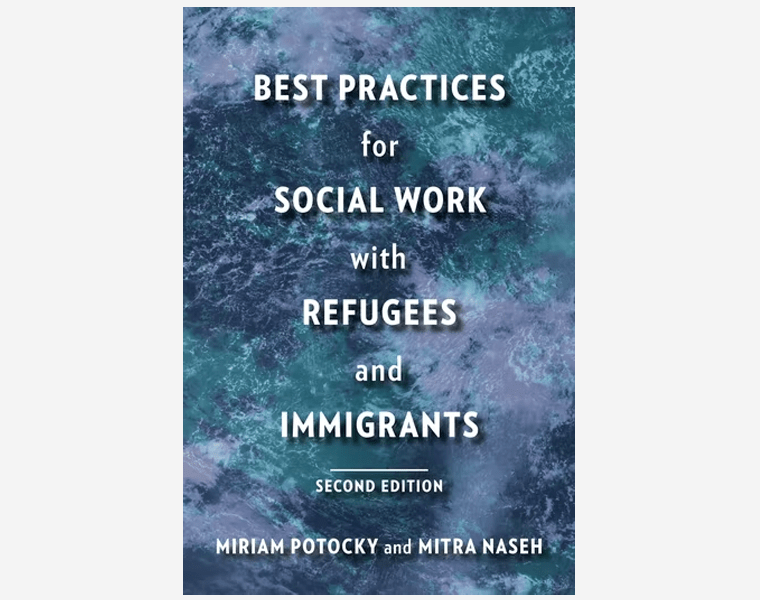Migration integration policies as social determinants of health for highly educated immigrants in the United States (Links to an external site)
Naseh, M., Zeng, Y., Rai, A. & Yoon, H. (2023). Migration integration policies as social determinants of health for highly educated immigrants in the United States. BMC Public Health. 23: 1358. https://doi.org/10.1186/s12889-023-16254-x
Factors associated with poverty among refugees in the United States (Links to an external site)
Naseh, M., Potocky, M., Burke, S., Stuart, P. H., & Huffman, F. G. (2022). Factors associated with poverty among refugees in the United States. Journal of Poverty. https://doi.org/10.1080/10875549.2022.2128974
Multidimensional Deprivation amongst Refugees in the USA (Links to an external site)
Naseh, M., Held, M. L., Gilbertson, G.*, Shrestha, L.* (2022). Multidimensional Deprivation amongst Refugees in the USA. The British Journal of Social Work. https://doi.org/10.1093/bjsw/bcac200
Education of Afghan refugee children in Iran: A structured review of policies (Links to an external site)
Seddighi, H., Naseh, M., Rafieifar, M., & Ilea, P. (2022). Education of Afghan refugee children in Iran: A structured review of policies. Children & Society. https://doi.org/10.1111/chso.12620
Eye Movement Desensitization and Reprocessing to reduce post-traumatic stress symptoms among forcibly displaced people: A systematic review and meta-analysis (Links to an external site)
Rafieifar, M., & Macgowan, M. J. (2022). A meta-analysis of group interventions for trauma and depression among immigrant and refugee children. Research on Social Work Practice, 32(1), 13-31. https://doi.org/10.1177/10497315211022812
Afghan refugees in Iran: The role of NGOs, INGOs, and humanitarian organizations over the past four decades
Naseh, M., Abtahi, Z., & Azari, P. (2022). Afghan refugees in Iran: The role of NGOs, INGOs, and humanitarian organizations over the past four decades. In G. Inanc & L. Themba (Eds.), Forced Displacement and NGOs in Asia and the Pacific (pp. 35–47). Routledge.
Chronic conditions and psychological distress in older Asian Americans: The role of subjective health perception (Links to an external site)
Yoon, H., Kim, S., Naseh, M., & Jang, Y. (2022). Chronic conditions and psychological distress in older Asian Americans: The role of subjective health perception. Journal of Gerontological Social Work, 65(6), 604–617. https://doi.org/10.1080/01634372.2021.2005213
A meta-analysis of group interventions for trauma and depression among immigrant and refugee children (Links to an external site)
Rafieifar, M., & Macgowan, M. J. (2022). A Meta-Analysis of Group Interventions for Trauma and Depression Among Immigrant and Refugee Children. Research on Social Work Practice, 32(1), 13–31. https://doi.org/10.1177/10497315211022812
Impacts of COVID-19 on refugees and immigrants in the United States: A call for action (Links to an external site)
Rafieifar, M., Naseh, M., Potocky, M., Zajicek-Farber, M., Kim, W., Padilla, B., Reina Ortiz, M., & Lopez, J. (2021). Impacts of COVID-19 on refugees and immigrants in the United States: A call for action. International Social Work. 64(5), 771–776 https://doi.org/10.1177/00208728211017964
Creating welcoming communities for LGBTQ migrants: Living room-style chats for service providers (Links to an external site)
Acevedo, S., Rivera, O., Potocky, M., Naseh, M., Alessi, E. J., & Burgess, A. (2020). Creating welcoming communities for LGBTQ migrants: Living room-style chats for service providers. Journal of Ethnic & Cultural Diversity in Social Work, 29(1–3), 244–249. https://doi.org/10.1080/15313204.2020.1731043
Global South Scholars in the Western Academy: Harnessing Unique Experiences, Knowledges, and Positionality in the Third Space
Martin, S. B. & Dandekar, D. (Eds.). (2021). Global South Scholars in the Western Academy: Harnessing Unique Experiences, Knowledges, and Positionality in the Third Space, Routledge.
Syrian refugees’ perspectives and service providers’ viewpoints on major needs and future plans in Jordan (Links to an external site)
Naseh, M., Liviero, N., Rafieifar, M., Abtahi, Z., & Potocky, M. (2020). Syrian refugees’ perspectives and service providers’ viewpoints on major needs and future plans in Jordan. Journal of International Humanitarian Action, 5(14). https://doi.org/10.1186/s41018-020-00083-3
Timing of immigration effects asset change among Hispanic caregivers of older family members (Links to an external site)
Cadet, T., Burke, S., Nejad-Haiem, F., Bakk, L., Naseh, M., Grudzien, A., O’Driscoll, J., & Alcide, A. (2021). Timing of immigration effects asset change among Hispanic caregivers of older family members. Journal of Family and Economic Issues. 42(3), 561–572 https://doi.org/10.1007/s10834-020-09719-3
Creating welcoming communities for LGBTQ migrants: Living room-style chats for service providers (Links to an external site)
Acevedo, S., Rivera, O., Potocky, M., Naseh, M., Alessi, E. J., & Burgess, A. (2021). Creating welcoming communities for LGBTQ migrants: Living room-style chats for service providers. In M. Y. Lee (Ed.), Immigrant and refugee youth and families: Research and practice (pp. 251–256). Routledge.
featured book

Best Practices for Social Work with Refugees and Immigrants
Miriam Potocky & Mitra Naseh
Columbia University Press
Social work practice with refugees and immigrants requires specialized knowledge of these populations and specialized adaptations and applications of mainstream services and interventions. Because they are often confronted with cultural, linguistic, political, and socioeconomic barriers, these groups are especially vulnerable to psychological problems such as anxiety, depression, alienation, grief, and post-traumatic stress disorder, as well as concerns arising from inadequate health care. Institutionalized discrimination and anti-immigrant policies and attitudes only exacerbate these challenges.
Paperbook, hardcover, e-book